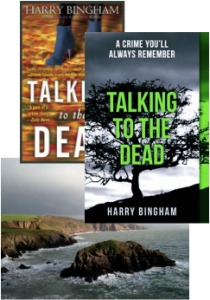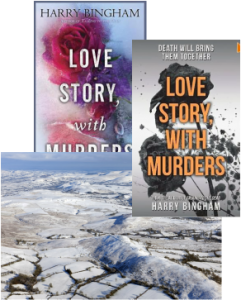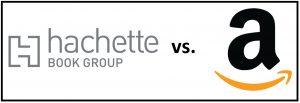
Harry Bingham reached out to me last week with a link to an article he published on his blog about the Amazon/Hachette situation. I was intrigued by his point of view and his intentions to become a hybrid author. He kindly agreed to an interview to expand on his views. His candor and openness impressed me, and I hope you feel the same.
TeleRead: You’ve been a traditionally published author for fifteen years or so and yet you’re embarking now on the process of becoming a true hybrid author: that is, one with books that are both conventionally and self-published. Why the shift?
Bingham: It came about because, when my contract with Random House, my US publisher, expired, we were unable to agree on a way to extend it. In the past, I’d have taken anything I was offered because, quite simply, what were my options? On this occasion, I knew I had a real alternative – namely, distributing my work via Amazon, iTunes and the rest – and I was able to turn down any arrangement that didn’t, in my view, match the expected proceeds of that route.
That was the commercial logic, but it wasn’t merely my head choosing. The truth was, I was excited by the freedom and the challenge. To make my own decisions, choose my own covers, find my own readers. Because I have a fantastic platform at home with Orion (part of Hachette), it was easy enough to take a risk with North America. I don’t think I’ll fail completely to find an audience, but if do it won’t be the end of the world.
And that’s the real beauty of the hybrid arrangement. On the one hand, I have a confident and committed UK publisher accessing book stores and the traditional channels of acclaim (newspaper reviews and the rest), plus I get an income stream I can rely on. Then on the other hand, I have the freedom to experiment – and to do so in the knowledge that I can reap 100% of the royalties if I do well. It truly feels like the best of both worlds.
TeleRead: Did you feel you had a good/neutral/poor experience with your publishers? Areas like editing (amount and quality), cover art design, blurb writing, contract terms, etc?
Bingham: With Orion in the UK, I’ve had a fantastic experience. They’ve been the best publisher I’ve ever had.
But with Random House in the US, I can’t say any different. I didn’t get much direct editorial feedback from them (because it was channelled through my British editor), but their copyediting work was exceptional, as was everything on the production side. They produced strong covers and beautiful books. They got the review coverage rolling in a way that Orion didn’t manage to do with the first book. They were always easy and pleasant to deal with. I’ll come to some reservations in a moment, but those reservations have nothing to do with the firm’s basic quality. They published me very well.

But, if I may, I’ll also speak a word about my experience with publishers in the dozen years (and ten or so books) before I started on my Fiona Griffiths crime series. I won’t name names here, but – working only with large publishers – I experienced some gross and unpardonable breaches of contract and some publishing so lazy, so uncommitted that it barely deserved the name.
The truth is that plenty of authors have been ill-served by their publishers over the years and e-publishing now offers those writers a real alternative. I therefore find the equivocations of the Writers’ Guild in the US and the Society of Authors in the UK to be baffling. Amazon and its kind have, for the first time in history, provided authors with a bargaining weapon of some genuine edge – and yet the bodies that represent those authors don’t like Amazon because it won’t say books are special? That attitude is so precious, it’s halfway to crazy.
TeleRead: You said Random House was the US publisher of your crime series, and that it was doing well. Why did they drop it? Do you think the reasons are consistent with other trends we’re seeing in traditional publishing? Many authors have been saying their publishers aren’t giving series titles a fair chance and that books are failing for reasons beyond author control–blurbs, cover, marketing, etc.
Bingham: Yes, just to toot my own horn for a moment, my first Fiona Griffiths book scored starred reviews in Publishers Weekly and Kirkus, a four star review in USA Today, and was picked as a Crime Book of the Year by the Seattle Times and the Boston Globe. The second book did similarly well. (You can see those reviews and learn more about the books here.)
I don’t think a crime publisher could ask for much more from a new author and, as I say, the books were handsomely produced and well marketed. What’s more, the first book earned out its advance very promptly and there’s no reason why it shouldn’t go on contributing as the series embeds itself.
So why did RH get cold feet? The answer, I think, is that they were locked into an inappropriate model for publishing the books. Here are the facts. I am, in US terms, a newbie author. My books are strange and dark and intelligent and committing. The crime market is already about 75% e-book, but when you take into account that a lot of print sales are dominated by existing bestsellers (the James Pattersons and Lee Childs), the natural market for my kind of book must be 85%+ e-book.
So I think logic says, you would launch the book electronically to start with, then bring in print as and when you have secured a readership. Only Random House didn’t do that. They launched me the regular way, with $27 hardbacks, followed later by trade paperbacks. Trouble is, the market now doesn’t want $27 hardbacks by unknown authors – readers would rather spend $5 experimenting with a new name, then trade up in due course if they decide they like what they find. And that makes sense. I’d do the same. The $27 dollar hardback is a ridiculous discovery-type product; the cheap e-book is an excellent one. Why build a strategy round the first of those things? It makes no sense.
 In any case, while the e-books sold just fine, readers didn’t really want the hardback and then, because retailers had been unable to shift the hardback, they turned down the paperback too. We were just caught selling the wrong product.
In any case, while the e-books sold just fine, readers didn’t really want the hardback and then, because retailers had been unable to shift the hardback, they turned down the paperback too. We were just caught selling the wrong product.
Now of course, Random House is hardly a bunch of idiots. I’m sure they know all this. But first, there’s an iron separation between the traditional (hardback-first) imprints and the e-only ones. That separation itself is illogical: an editor should be able to bring out books in the formats, and on the timings, that make most sense for that book and that author.
But then there’s also the iron-clad-in-steel rule that no Big 5 publisher can pay more than 25% royalties on e-books. They have that rule, because of the mortal threat to their business model that would arise if that rampart was seriously breached. Yet – from an author’s perspective – it makes no damn sense at all. The costs of creating and distributing an e-book are footling, so in effect that 25% royalty arrangement implies that Random House believes it can quadruple (or more than quadruple) my e-sales. That is: it will generate so much additional revenue that I’ll be better off getting 25% of a huge cake, then 100% of a small one.
Now, if they actually believed that to be the case, I’d have expected them to make the argument. When I showed that I was inclined to turn down a 25%, e-only deal, they should have come to me saying, ‘Harry, we know 25% doesn’t sound great, but we’re going to add a ton of value, and sell a gazillion e-books, and here’s how we plan to do it.’ But they didn’t say that. They didn’t make any argument at all. The silence itself was eloquent.
TeleRead: What do you see as your biggest challenges publishing the rest of the series on your own?
Bingham: The technical stuff – formatting, metadata, book covers, distribution, all that – will be easy-peasy. It’s also easy submitting my work to PW and Kirkus for review. The hard bit will be building my own readership, but that will be something which builds over time. I’ll only properly know how I’m doing once I’m 3 or 4 books into my campaign.
The two tools I’ll make most use of will be aggressive pricing and a mailing list.
On the pricing, I can halve Random House’s price to readers and still double my royalty, so I can easily afford to undercut typical Big 5 pricing. I’ll also make extensive use of free and discounted marketing campaigns, of the sort offered by Bookbub. Big publishers do have somewhat better access to these things than I do, but the differential isn’t vast.
As for the mailing list, my aim is to build up a real body of readers who ask me to alert them when I have a book coming out. That tool is so powerful it’s extraordinary that regular publishers don’t make better use of it. It’s not that those readers alone will create sufficient sales on their own; rather that I’ll want to create a sales surge big enough that the book can start to get visibility on genre bestseller lists, then build from there. (Oh, and if you like intelligent, noirish crime, then you can sign up for my mailing list right here, right now. What do you possibly have to lose?)
In addition, I’m lucky enough to enjoy a fairly powerful online platform here in the UK. (I run two websites, the Writers’ Workshop and Agent Hunter, which between them get monthly website traffic of about 100,000 users.) I’ll certainly use that platform to talk about the issues we’re discussing in this interview. If that leads to some extra book sales, that’s great, but on the whole, those online platforms don’t make great selling tools for fiction. Put another way: I think the whole tweety-bloggy-social media thing is overhyped.
TeleRead: Do you plan to use Kindle Select? Why or why not?
Bingham: No. I would happily use it in the UK, where Amazon has a roughly 90% share of the e-book market. In the US, there’s more diversity and I think it’s important to be on as many platforms as possible.
TeleRead: How much of the self-publishing process do you plan to outsource and why?
Bingham: I’ll outsource nearly all of it. My editorial input I get from Orion in the UK, but I’d certainly pay for editing help if I didn’t already have it on tap. Getting really classy freelance editors is simple – not least for me, because my own Writers’ Workshop offers just such a service.
Copyediting: the same. I’ll get it from Orion, but would pay for it if I had to.
Formatting the Word document for e-readers: I’ll pay experts to do this. I’ve already launched a few backlist titles in the US and pay about $100 for each title. That’s peanuts.
Cover design: I’ll certainly outsource this too. Outfits such as Odesk or 99designs make it easy to get good talent at reasonable prices. Cover is important, of course, so I’ll spend money quite liberally here: $500 or more, if need be.
Distribution: I’ll probably deal with Amazon, iTunes and Barnes and Noble direct, but there are companies who’ll handle the whole upload process if you want to do that.
The thing I won’t outsource at all is the marketing. The communication with my readers is something I want to have under my direct control.
TeleRead: Have you thought about getting all your rights back and self-publishing everything? Why or why not
Bingham: Not just thought about it: I’ve tried to get my UK backlist off the publishers I’ve worked with. And basically, I’ve not even been able to have a conversation with them. They just don’t respond to my (polite, repeated) enquiries. That is, quite frankly, exceptionally rude, given that I was with one of those publishers for ten years.
As for getting my US rights back, yes, I’ll probably seek to have that conversation in due course, but the hardcover of the second Fiona Griffiths book only came out in February of this year, so the publication process is still quite active.
 TeleRead: Thoughts on the Hachette/Amazon situation?
TeleRead: Thoughts on the Hachette/Amazon situation?
Bingham: Ha! Yes, indeed. I’ve got some quite extensive thoughts here but, in a nutshell, I think the whole thing is odd.
Amazon is clearly getting a bashing in the press, because it’s acting rough with Hachette – yet when Barnes and Noble did the exact same thing to Simon & Schuster, nobody cared, no matter that the impact on authors was very much the same.
Amazon also gets attacked for its monopoly position which, we’re told, threatens the industry. Yet the trade broadly supported the Random/Penguin merger which now swallows a quarter or more of the trade in the US and the UK. How is that any better for authors?
And Amazon gets savaged for driving down book prices and thereby hurting authors – yet this is a firm that pays authors e-royalties that are four times greater than those offered by regular publishers. What’s more, the firm gives authors real time access to sales data, pays very promptly, allows every author to access pretty much every reader in the world for free – and sells more books (and generates more author-revenues) than anyone else. How is this bad? And even that looking at the price discounting issue alone, one has to remark that supermarkets in the UK now account for 20% of all book sales and have done for years. They discount heavily, but the trade loves them for their ability to shift books. So, again, when Amazon does the same thing, it’s bad because …?
All that said, I do understand how unsettling Amazon is. I have excellent literary agents on both sides of the Atlantic, and both those agencies offer help with self-publishing. I chose, in fact, to go it alone, but it was the first time ever that my own financial interests and those of my literary agent were not wholly aligned. Now, my agents behaved impeccably, but I did for the first time realise that Amazon had the capacity to unsettle even the closest of relationships: that between an author and his or her agent. The whole situation must be even more unsettling for publishers and I think this transition has a long way yet to run.
TeleRead: Thank you very much for the interview!


































Great interview, thank you. It’s refreshing to see a balanced view from a traditional published/soon-to-be hybrid author.
Juli- Thank you so much for this interview. I enjoyed the first Fiona Griffiths and picked up the second one a few days ago. If anyone else is interested it is still on sale at Amazon for $1.99.
I don’t see a link to his books at the various sites so you might want to post those. If I weren’t already watching his books, I’d have gone looking and you might as well get some affiliate fees.
Harry, thanks for sharing this. Your reasons for striking out on a new career path seem intelligent and thoughtful and just sound business sense in today’s publishing environment. I just signed up for your email list and am on my way to find my first Harry Bingham book.
An outstanding interview with a lot of helpful information.
I had been a “hybrid publisher” for at least 20 years before the term was ever used and still am. I also have many good things to say about traditional publishers and a lot of the not-so good things. (Same with Amazon, too.)
In short, every writer must find his or her own way to be successful at this game and must be willing to put in whatever work (that includes marketing) that is required. It is not easy but very rewarding when one succeeds at this game like I have.
Hi all
Thanks for the nice comments – and extra thanks to anyone who signed up to my mailing list!
And yes: I think one of the ways Amazon has changed things is that authors could in the past hand all their business affairs over to a competent agent and really not have to think again about all that. These days, it ain’t so simple. Now personally, I welcome the fact that I have to think like a businessman. I enjoy the challenge. I like the release from simply being a creative. But not all authors are the same and there’s no question that things do feel more unsettled now than they have done since I first became a pro writer 15 years ago. Scary, interesting, changeable times.
Dear Harry, I love your crime books – thoughtful and imaginative. But your site won’t let me sign up to be alerted to new ones. Is it because I am in Australia ? Anyway, I admire your stand with the publishers and can’t wait to read next Fiona Griffiths.